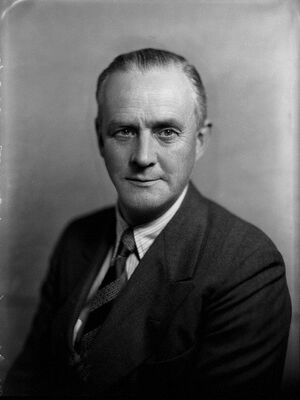Clement Davies
(politician) | |||||||||||||||||||||
|---|---|---|---|---|---|---|---|---|---|---|---|---|---|---|---|---|---|---|---|---|---|
 | |||||||||||||||||||||
| Born | 19 February 1884 Llanfyllin, Powys, Wales | ||||||||||||||||||||
| Died | 23 March 1962 (Age 78) Montgomery, Powys, Wales | ||||||||||||||||||||
| Nationality | British | ||||||||||||||||||||
| Alma mater | University of Cambridge/Trinity Hall | ||||||||||||||||||||
| Party | Liberal Party (UK) | ||||||||||||||||||||
Attended the first Bilderberg as Leader of the UK Liberal Party
| |||||||||||||||||||||
Clement Edward Davies was a British politician from Llanfyllin, Wales. A lawyer by trade, he was the leader of the Liberal Party from 1945 to 1956. He attended the the first Bilderberg meeting.
Education
He studied law at Trinity Hall of the University of Cambridge.[1]
Career
Davies was called to the bar in 1909. In 1914, at the outbreak of the First World War, he was appointed adviser within the office of the Procurator-General on enemy activities in neutral countries and on the high seas. He was later made responsible for trading with the enemy, a position within the Board of Trade.[2]
He was elected MP for Montgomeryshire at the 1929 general election and retained the post until his death.
At the outbreak of the Second World War he chaired an action committee which pressed for a more effective conduct of the war effort, and he is credited with persuading Lloyd George to speak in the House of Commons in May 1940 in favour of Neville Chamberlain's resignation. Lord Boothby, a first-hand observer of these events, was to describe Davies as one of the architects – some may judge the principal architect – of the coalition government led by Churchill.
He became the leader of the Liberal Party after the 1945 elections, the holder of this office, Archibald Sinclair, having been unexpectedly defeated in his constituency of Caithness and Sutherland.[2]
During the decade when Clement Davies led it, the Liberal Party saw its electoral results shrink massively: 12 deputies in 1945, 9 in 1950, 6 in 1951 and 1955. In the last two elections, the Liberals received less than 750,000 votes, barely 2.5% of the votes cast. Davies nevertheless ensured the survival of his party in a period of increased polarization, in particular by refusing any agreement with Winston Churchill's Conservatives.[2]
He was pro-NATO and for British association with the European Defence Community.[3] He was a delegate to the 1960 NATO Parliamentary Assembly.[4]
Davies relinquished the leadership of the Liberal Party in 1956. Victim of health problems related to his alcoholism, he decided that he would not run for re-election after the 1959 elections. He became President of the Parliamentary Association for World Government.[2] He died three years later.
Events Participated in
| Event | Start | End | Location(s) | Description |
|---|---|---|---|---|
| Bilderberg/1954 | 29 May 1954 | 31 May 1954 | Netherlands Hotel Bilderberg Oosterbeek | The first Bilderberg meeting, attended by 68 men from Europe and the US, including 20 businessmen, 25 politicians, 5 financiers & 4 academics. |
| Bilderberg/1956 | 11 May 1956 | 13 May 1956 | Denmark Fredensborg | The 4th Bilderberg meeting, with 147 guests, in contrast to the generally smaller meetings of the 1950s. Has two Bilderberg meetings in the years before and after |
References
- ↑ https://liberalhistory.org.uk/history/clement-davies-edward/
- ↑ a b c d https://liberalhistory.org.uk/history/clement-davies-edward/
- ↑ https://www.theyworkforyou.com/debates/?id=1954-04-14a.1141.3
- ↑ https://hansard.parliament.uk/Commons/1960-02-01/debates/a0927235-8186-4e67-9490-b07c66fd9b88/NatoConference(BritishDelegates)